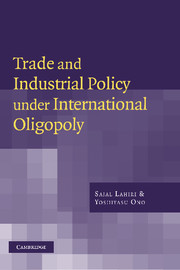Book contents
- Frontmatter
- Contents
- List of figures
- List of tables
- Preface
- Introduction
- 1 Cost asymmetry and industrial policy in a closed economy
- 2 R&D policy
- 3 Trade and industrial policy under foreign penetration
- 4 Trade and industrial policy under asymmetric oligopoly: a synthesis
- 5 Trade policy when producers and sellers differ
- 6 Foreign penetration in the presence of unemployment
- 7 Local content requirement and profit taxation
- 8 Export-oriented foreign direct investment
- 9 Lobbying for local content requirement
- 10 Foreign direct investment in the presence of cross-hauling
- Bibliography
- Index
4 - Trade and industrial policy under asymmetric oligopoly: a synthesis
Published online by Cambridge University Press: 22 September 2009
- Frontmatter
- Contents
- List of figures
- List of tables
- Preface
- Introduction
- 1 Cost asymmetry and industrial policy in a closed economy
- 2 R&D policy
- 3 Trade and industrial policy under foreign penetration
- 4 Trade and industrial policy under asymmetric oligopoly: a synthesis
- 5 Trade policy when producers and sellers differ
- 6 Foreign penetration in the presence of unemployment
- 7 Local content requirement and profit taxation
- 8 Export-oriented foreign direct investment
- 9 Lobbying for local content requirement
- 10 Foreign direct investment in the presence of cross-hauling
- Bibliography
- Index
Summary
Introduction
Chapters 1 and 3 investigated the welfare effect of various policies that restrict a firm's production, such as a production tax-cum-subsidy and removal of a firm in a closed- and an open-economy context. In both chapters the existence of cost asymmetry played an important role. This chapter provides a general model that synthesizes those two models. It also synthesizes various models in the literature on trade and industrial policies in oligopolistic markets.
The literature on international trade with international oligopolistic interdependence in production is voluminous and various issues have been discussed. The question of appropriate and strategic trade and industrial policies becomes an obvious target for analysis in models with oligopolistic industries. Optimal R&D policies – see, for example, Lahiri and Ono (1999b), Spence (1984) and Spencer and Brander (1983) – entry–exit policies – see, for example, Dixit (1984), Lahiri and Ono (1988), Okuno-Fujiwara and Suzumura (1993), Ono (1990) and Suzumura and Kiyono (1987) – and the optimal trade policy in an oligopolistic market with and without free entry – see, for example, Brander and Spencer (1985), Eaton and Grossman (1992), Hortsmann and Markusen (1986), Markusen and Venables (1988) and Venables (1985) – have all received quite a lot of attention in the literature.
Previous analyses on tax policies have considered across-the-board taxes or subsidies under either the assumption that the number of firms is fixed or that there is completely free entry and exit. Similar comments also apply to the literature on other forms of industrial policies.
- Type
- Chapter
- Information
- Publisher: Cambridge University PressPrint publication year: 2003
- 1
- Cited by



